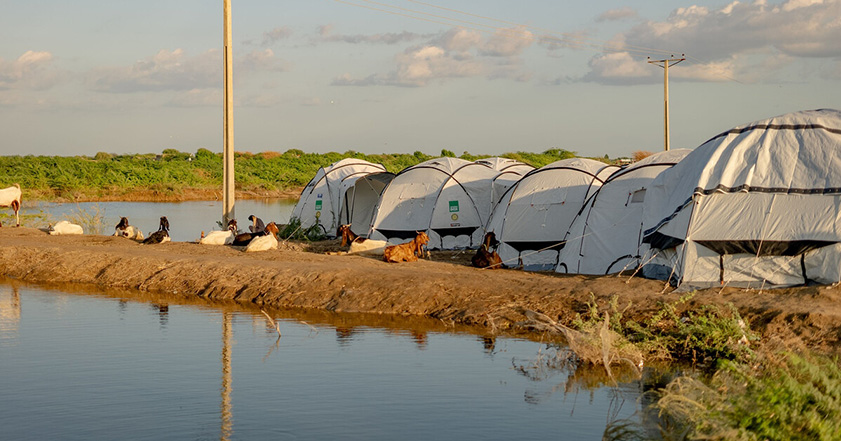Press release – 14 June 2023
The CEO of the international disaster relief charity, ShelterBox, has issued an open letter to the UK media over the damaging use of the term ‘natural’ disaster. Speaking on the first anniversary of the monsoon flooding in Pakistan, Sanj Srikanthan urged for the reporting of disasters to be reframed and warned of the harm failing to do so could have on affected communities.
ShelterBox regularly sees the impact of disasters on communities. Since 2000, the charity has helped more than 2.5 million displaced people in 98 countries across the world with different combinations of emergency shelter, support, and essential household items.
ShelterBox responds to earthquakes, tsunamis, volcanic eruptions, and extreme weather like storms, drought, and flooding, which occur because of natural processes on Earth. But it is how these events affect people, or the environment, that has the potential to make them a disaster – influenced by human factors like where people live, what types of home they have, political instability, and the lack of proactive measures to protect vulnerable communities.
In an open letter Mr Srikanthan said:
The term ‘natural’ disaster has long been widely used by the media to describe tropical storms, floods, earthquakes, and volcanic eruptions, but there needs to be an urgent shift in the language we use. While the term may seem harmless, and we’ve not always got it right, we’ve learnt through our ongoing work with disaster affected communities, how it perpetuates a dangerous myth that nothing could have been done to prevent people being so badly affected. This misleading and harmful narrative can lead to a lack of action to help people who need it.
The language we use matters. Disasters are not ‘natural’. Let’s stop saying they are. When we frame disasters as ‘natural’, we fail to acknowledge the complex interplay between nature and the role of human actions and how they impact communities around the world.
A disaster is not a natural occurrence but a result of systemic inequalities in access to resources and power. Where we live and how much money we have often determines our ability to recover. By framing these events as ‘natural’, we undermine the need for proactive measures to protect vulnerable communities. It masks the underlying social, economic, and political instability that make marginalised and disadvantaged communities disproportionately affected.
At ShelterBox we respond to disasters all over the world, providing emergency shelter and other essential items to people left with very little. Our teams see first-hand how issues like inequality, poverty, urbanisation, deforestation, and the climate crisis, can make communities more vulnerable. Yet public discourse still often sweeps the issues under the banner of ‘natural’ disasters, most recently in coverage of the earthquakes in Türkiye and Syria and the monsoon flooding in Pakistan.
When I visited Pakistan after monsoon flooding last year, it was clear how the devastating impacts of the floods were within humanity’s power to mitigate – the people worse affected were those living in poverty, with the least means to protect themselves, and few resources to withstand the next event. It was little reported that regions of Pakistan were in the middle of drought and food insecurity just prior to the flooding that compounded a pre-existing crisis. We cannot continue to overlook human failings under the guise of a ‘natural’ disaster. One year on from the floods in Pakistan, we are still seeing the crippling impact on communities.
Instead of using ‘natural’ disaster we simply say ‘disaster’ or are more specific, describing the extreme weather, earthquake, tsunami, or volcanic eruption. I urge the media to act, help us in breaking this cycle, by reframing their reporting and committing to language that accurately reflects why people are affected so badly.
Only then does it pave the way to rightly address the underlying causes of vulnerability and work toward a more just and equitable future for all, with the necessary investment, resources, and proactive measures to help protect affected communities.
As well as the monsoon flooding in Pakistan, ShelterBox is currently helping people displaced by other extreme weather events, including Cyclone Freddy in Malawi, and the worst drought to hit East Africa in 40 years.
It’s also supporting people affected by the earthquakes in Türkiye and Syria, and working in Ukraine, Yemen, Syria, Burkina Faso, Cameroon, and Mozambique to help people who have had to flee their homes, or had them damaged, because of conflict.
ENDS
For more information contact the press office at ShelterBox via [email protected].
Notes to Editors
- Interviews with ShelterBox CEO, Sanj Srikanthan and Head of Emergency Responses, Alice Jefferson available on request
- Photographs and b-roll available
About ShelterBox
ShelterBox provides emergency shelter and other essential items to families who have lost their homes to disasters. With operational headquarters in Cornwall, the charity also has 14 affiliate organisations worldwide.
The charity has been Rotary International’s project partner in disaster relief since 2012. ShelterBox has supported more than 2.5 million people since it was founded in 2000. www.shelterbox.org

